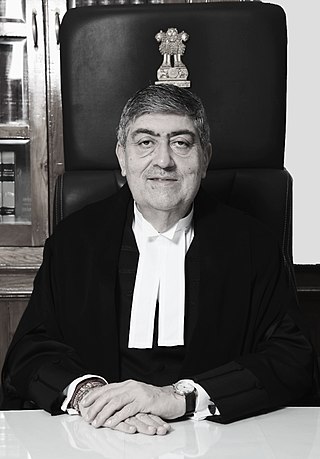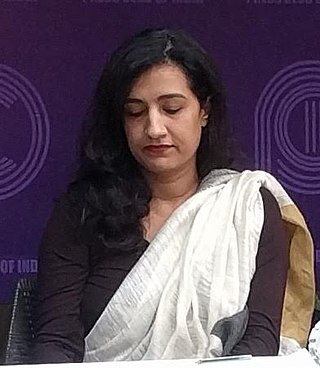
Arun Shourie is an Indian economist, journalist, author and politician. He has worked as an economist with the World Bank, a consultant to the Planning Commission of India, editor of the Indian Express and The Times of India and a Minister of Communications and Information Technology in the Vajpayee Ministry (1998–2004). He was awarded the Ramon Magsaysay Award in 1982 and the Padma Bhushan in 1990.

The Berkman Klein Center for Internet & Society is a research center at Harvard University that focuses on the study of cyberspace. Founded at Harvard Law School, the center traditionally focused on internet-related legal issues. On May 15, 2008, the center was elevated to an interfaculty initiative of Harvard University as a whole. It is named after the Berkman family. On July 5, 2016, the center added "Klein" to its name following a gift of $15 million from Michael R. Klein.
Section 377 is a British colonial penal code that criminalized all sexual acts "against the order of nature". The law was used to prosecute people engaging in oral and anal sex along with homosexual activity. As per a Supreme Court Judgement since 2018, the Indian Penal Code Section 377 is used to convict non-consensual sexual activities among homosexuals with a minimum of ten years’ imprisonment extended to life imprisonment. It has been used to criminalize third gender people, such as the apwint in Myanmar. In 2018, then British Prime Minister Theresa May acknowledged how the legacies of such British colonial anti-sodomy laws continue to persist today in the form of discrimination, violence, and even death.

Konakuppakatil Gopinathan Balakrishnan is an Indian judge who served as Chief Justice of the Supreme Court of India and later the chairperson of the National Human Rights Commission of India. He was the first judge from Kerala to become the Chief Justice of the Supreme Court. His tenure lasting more than three years has been one of the longest in the Supreme Court of India. While being Chief Justice of Gujarat High Court, he was appointed the acting governor of Gujarat from 16 January 1999 to 18 March 1999. In 2010, he was conferred with an honorary doctorate by Cochin University of Science and Technology.

The Information Technology Act, 2000 is an Act of the Indian Parliament notified on 17 October 2000. It is the primary law in India dealing with cybercrime and electronic commerce.

Jayati Ghosh is an Indian development economist. She taught economics at Jawaharlal Nehru University, New Delhi for nearly 35 years, and since January 2021 she has been Professor of Economics at the University of Massachusetts Amherst, USA. Her core areas of study include international economics and globalisation, employment patterns in developing countries, macroeconomic policy, and gender and development.
The Constitution of India provides the right to freedom, given in article 19 with the view of guaranteeing individual rights that were considered vital by the framers of the constitution. The right to freedom in Article 19 guarantees the freedom of speech and expression, as one of its six freedoms.
The hate speech laws in India aim to prevent discord among its many ethnic and religious communities. The laws allow a citizen to seek the punishment of anyone who shows the citizen disrespect "on grounds of religion, race, place of birth, residence, language, caste or any other ground whatsoever". Section 153A of the Indian Penal Code prohibits citizens from creating disharmony or feelings of enmity, hatred or ill-will between different groups of people.

Angana P. Chatterji is an Indian anthropologist, activist, and feminist historian, whose research is closely related to her advocacy work and focuses mainly on India. She co-founded the International People's Tribunal on Human Rights and Justice in Kashmir and was a co-convener from April 2008 to December 2012.
Shiv Visvanathan is an Indian academic best known for his contributions to developing the field of science and technology studies (STS), and for the concept of cognitive justice, a term he coined. He is currently Professor at O P Jindal Global University, Sonepat. He was Professor, Dhirubhai Ambani Institute of Information and Communication Technology (DA-IICT), Gandhinagar, India and has held the position of Senior fellow Center for the Study of Developing Societies (CSDS) in Delhi He has also taught at the Delhi School of Economics. He has held visiting professorships at Smith College, Stanford, Goldsmiths, Arizona State University and Maastricht University, Harvard University & Oxford University. He is author of Organizing for Science, A Carnival for Science and has co-edited Foulplay: Chronicles of Corruption. He has been consultant to the National Council of Churches and Business India.

Nivedita Menon is a writer and a professor of political thought at Jawaharlal Nehru University, Delhi. She previously taught at Lady Shri Ram College and the Department of Political Science at Delhi University.

Sanjay Kishan Kaul is a former judge and lawyer who served as a judge of the Supreme Court of India since 2017 until upon his retirement in 2023. He has served as the first puisne judge, senior-most after the Chief Justice of India. Also, he has been the ex officio executive chairman of National Legal Services Authority.

Karuna Nundy is an Indian lawyer and Senior Advocate at the Supreme Court of India, designated as a Senior Advocate in 2024. She is qualified to practice in both India and New York. Her notable cases include enforcing blockchain regulations on behalf of Paytm against telecom companies, securing damages for a disability rights activist against SpiceJet, and addressing issues related to platform liability and online speech restrictions. She has also worked on efforts to provide safe water to Bhopal gas disaster victims. Her practice areas include constitutional law, commercial litigation, arbitration, intellectual property, technology law, and international law. She also serves as a mediator at the Supreme Court Mediation Centre.
Justice Gita Mittal is a retired Indian judge. She is the former Chief Justice of the Jammu and Kashmir High Court and the first woman judge to serve in that capacity. She has also served as the Acting Chief Justice of Delhi High Court while she was serving as a Judge of the Delhi High Court.

Primavera De Filippi is a French legal scholar, Internet activist and artist, whose work focuses on the blockchain, peer production communities and copyright law. She is a permanent researcher at the CNRS and Faculty Associate at the Berkman Klein Center for Internet & Society at Harvard University. She is the author of the book Blockchain and the Law published by Harvard University Press. As an activist, she is a part of Creative Commons, the Open Knowledge Foundation and the P2P Foundation, among others.

Susan Benesch is an American journalist and scholar of speech who is known for founding the Dangerous Speech Project. Benesch is a free speech advocate, recommending the use of counterspeech rather than censorship to delegitimize harmful speech.

Gautam Bhatia is a constitutional law scholar and science fiction author from India.
Shalu Nigam is an Indian lawyer, feminist legal scholar, and author. She was the petitioner in the landmark case Shalu Nigam v. Regional Passport Officer, decided on 17 May 2016, which held that passports can be issued without requiring the name of the father.
In December 2021, a dharma sansad of Hindu ascetics was held at Haridwar in Uttarakhand, India, where hate speeches were delivered in which the speakers called for a genocide against Muslims in the name of protecting Hinduism. The government's apathy in the face of the hate event has been condemned by a wide cross section of Indian society, including retired military leaders, civil society activists, students, academics, and retired judges.
Nupur Sharma is an Indian politician. She was the national spokesperson of the Bharatiya Janata Party (BJP) until June 2022. She frequently represented BJP on Indian television debates as an official spokesperson. In June 2022, she was suspended from the party due to her comments about Muhammad and the age of his third wife, Aisha, at the time of their marriage and the consummation of the marriage as well her comments on other central doctrines in the Islamic tradition.












